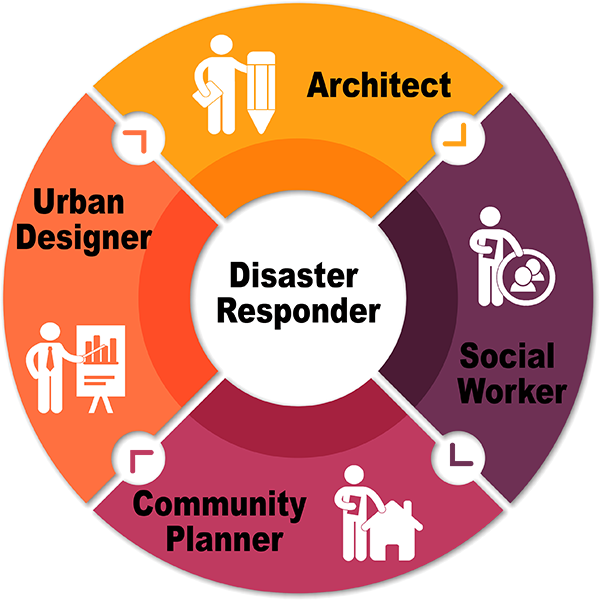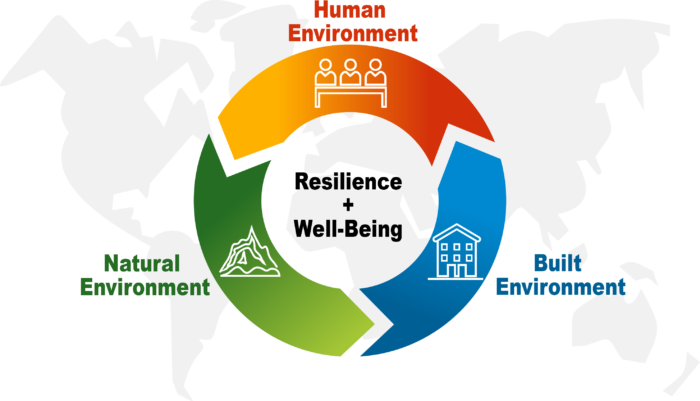About Me
I am the current Canada Research Chair (CRC) in Resilience, serving as an assistant professor in the School of Social Work, Faculty of Health, at Dalhousie University, Canada. I also hold two external research associate positions in (1) the Natural Hazards Center (NHC) at the University of Colorado Boulder (CU Boulder), the U.S., which is the international information clearinghouse for societal dimensions of hazards and disaster research; and (2) the Institute for Catastrophic Loss Reduction (ICLR) at Western University, Canada, which is one of the world-class centers for multi-disciplinary climate change and disaster prevention research.
 I have worn a few different hats in my professional life so far, as a social worker, an architect, a community planner, and an urban designer. Actually, all my friends and family call me a disaster responder because my research, teaching, and practice have been wholly devoted to one field, that is: community resilience and sustainability, in the global context of climate change, disaster, and other world crises.
I have worn a few different hats in my professional life so far, as a social worker, an architect, a community planner, and an urban designer. Actually, all my friends and family call me a disaster responder because my research, teaching, and practice have been wholly devoted to one field, that is: community resilience and sustainability, in the global context of climate change, disaster, and other world crises.
Global extreme events, caused by natural hazards (including epidemic), technological accidents, and intentional, willful acts of violence, have been increasing in frequency, intensity, magnitude, and scope, keeping pace with population growth and expansion, infrastructure sprawl, and economic and political instability. Coming from the built environment and the social science, I draw on my knowledge and experience from an interdisciplinary perspective, as an international hazards and disaster researcher, to examine the complexities of human-environment interplay. I have been utilizing socio-ecological protection approaches to advance community-based interventions (e.g., planning, architectural and urban design, and community development and outreach) aiming to reach the most marginalized and vulnerable populations (e.g., ethnic minorities, Indigenous, immigrants and refugees, and homeless) affected by various extreme events, to enhance their physical health, mental wellness, and overall well-being, and to build sustainability and resilience at individual, family, and community levels, through the two core values of human-environment interaction:
(i) Environmental Justice: providing benefits of built environment, especially affordable housing, to under-served populations; and
(ii) Social Justice: empowering human dignity and grassroots leadership in human settlement (community) development.
My innovative socio-ecological protection strategies devoted to climate change adaptation and disaster reduction, aiming
(i) to stimulate the transdisciplinary application of social, cultural, ecological, economic, and political dimensions into the empowerment of grassroots-led, housing-oriented community development initiatives that contribute to the enhancement of inhabitants’ health and well-being; and
(ii) to equip future urban planners, architects, and community developers with a nuanced understanding of comprehensive community-specific dimensions to maximize planning and architectural interventions’ benefits, advancing resilience and sustainability at individual, family, and community levels, and promoting equality, diversity, and inclusion in community development.

Education Background |
|
 |
Postdoctoral Research Associate, Natural Hazards Center, University of Colorado Boulder, USA, 2018-2019 |
 |
Postdoctoral Fellow, University of Calgary, Canada, 2014-2016 |
 |
Doctor of Philosophy, Interdisciplinary Studies, University of British Columbia, Canada, 2009-2014 |
 |
Master of Engineering in Architectural Design and Theory, Sichuan University, China, 2006-2009 |
 |
Bachelor of Engineering in Architecture (Honor), Sichuan University, China, 2001-2006 |
